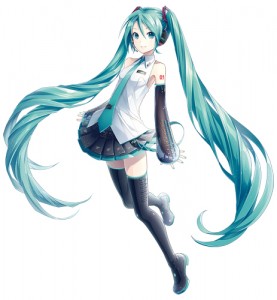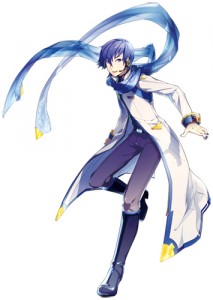If you read my post about VOCALOID last week, you probably saw this coming. If you didn’t, I strongly recommend you take a quick look at that one in order to understand what I’m about to show you now. All caught up? Great, then let’s get started!
This may seem rather bizarre since my last Motivational Music post featured classical music, but I guess that just goes to show how diverse my musical taste really is, and more importantly, how many different styles can inspire my writing (and hopefully yours). Ready for a taste of music from Japan? Then allow me to dig just a little deeper into the aforementioned love of mine by sharing music that features the voices of my three favorite Vocaloids: Hatsune Miku, Megurine Luka and KAITO.
Hatsune Miku
Genre(s): Pop, Rock, Electronic
Origin: Tokyo, Japan (Fujita Saki, Miku’s voice provider)
Writing Inspiration: Humor, Drama, Romance
My Favorite Song(s): “World is Mine“, “Magnet” (duet with Megurine Luka), “Romeo and Cinderella“, “Rolling Girl“, “Tell Your World“, “Senbonzakura”
My Favorite Producer(s): ryo (Supercell), Hachi, kz (livetune), wowaka, Mitchie M
Popularly known as “everyone’s favorite digital diva”, Hatsune Miku has been a national celebrity in Japan for years and more recently seems to be making quite an impact in the Western world. She was designed to represent the future of music (reflected in her name, as “hatsu-ne-miku” means “first sound of the future”), and by now has likely been used to sing in every genre of music imaginable (and I mean every genre, from opera and Broadway to heavy metal and dubstep). I often think of Miku as the Jack-of-all-trades of the Vocaloids; she has a voice suited to all types of music, but she isn’t always the best choice of vocals for a given song (case in point, virtually every other popular Vocaloid has a cover song that’s arguably better than its corresponding Miku original: “A Single Red Leaf” as sung by Luka, “Electric Angel” as sung by Rin and Len, “Poetaster and Singing Dolls” as sung by Gakupo, “My True Self” as sung by Kaito and Meiko, etc.). That being said, the songs that are well-suited for her are awesome.
Because most of her popular songs are upbeat, I’ve found Miku to be great inspiration for cheerful themes and stories with happy endings. At the same time, she sings a variety of songs that make good inspiration for other types of writing, including romantic, melancholy, terrifying, and just plain bizarre. Even if all you need is motivation to create, Miku is very good at cheering her listeners on and making them feel special. The subject matter of her songs covers everything from the meaning of life to vegetable juice, so whatever you plan to write, chances are there’s a Hatsune Miku song out there that may inspire you!
For some awesome music featuring Miku’s vocals, I recommend looking up songs produced by ryo, Hachi, livetune, wowaka and Mitchie M. Of course, great Hatsune Miku songs are never in short supply, as evidenced by the fact that she dominates Nico Nico Douga’s Hall of Legend. What can I say? She’s clearly everyone’s favorite digital diva for a reason!
Megurine Luka
Genre(s): Ballad, Pop, Dance
Origin: Tokyo, Japan (Asakawa Yuu, Luka’s voice provider)
Writing Inspiration: Drama, Tragedy, Romance
My Favorite Song(s): “Witch Hunt“, “Toeto“, “Double Lariat“, “Circus Monster“, “Happy Synthesizer” (duet with GUMI)
My Favorite Producer(s): fatmanP, Yuyoyuppe, Suzuki-P, Circus-P
My other favorite female Vocaloid, Megurine Luka‘s most notable quality is her ability to sing in both Japanese and English (hence the name “meguri-ne”, which translates as “round sound”). Unlike Miku, Luka is best known within the VOCALOID fandom as a ballad singer for her low mature-sounding voice, and most producers famous for using her have her sing slow, sad songs. That isn’t to say she only excels in this genre, though; in fact, some of her biggest hits are the type of songs that make you want to get up and dance (would you believe me if I told you I know the whole choreography to this song?). Her soft soothing vocals also make her an excellent choice for songs with romantic themes, so she’s definitely a potential favorite of fans who enjoy those types of stories!
Luka has been great inspiration for some of my more dramatic writing, such as romance and tragedy. Some of her best ballads are written by fatmanP and Yuyoyuppe, while Circus-P is famous for writing original songs for her in English. Luka is a popular choice among various producers, though, so your best bet to find great music featuring her voice is to check out her music page on the VOCALOID wiki. She may not be as famous as Miku, but you’ll find that she too has a wide variety of great songs to enjoy!
KAITO
Genre(s): Folk, Electronic, Rock
Origin: Japan (Fuuga Naoto, Kaito’s voice provider)
Writing Inspiration: Romance, Humor, Poetry
My Favorite Song(s): “A Thousand-Year Solo“, “Tsugai Kogarashi” (duet with MEIKO), “Cantarella“, “What’s COLOR?“, “Crescent Moon”
My Favorite Producer(s): Shigotoshite-P, Shinjou-P, natsuP, Kurousa-P
Kaito (also known by his fan-given name Shion Kaito) is my favorite male Vocaloid. In a franchise that consists mostly of female voices, it’s refreshing to enjoy a lower register of vocals once in a while (plus a cute face to match, *wink*). Being one of only two Japanese voicebanks for the original VOCALOID engine (the other being Meiko), he is actually older than Miku and Luka (who were both released for VOCALOID2), but took considerably longer to become as popular. Due to his standing as a veteran Vocaloid, Kaito has a tendency to sound more “electronic” than his successors, but the best producers who use his voice know how to play this to their advantage. Because of this, many of Kaito’s best songs don’t try to hide the fact that he isn’t real, but instead use him to create a unique sound or theme that a human singer couldn’t pull off.
Most of the songs featuring Kaito at his best come in the form of traditional folk music or electronic tracks that showcase his original sound, though he’s also frequently used to sing rock (usually in the visual kei band VanaN’Ice with Kamui Gakupo and Kagamine Len). He’s also very good at singing duets with other Vocaloids; one of the biggest shipping wars I’ve ever come across in the fandom is about whether he makes a better couple with Miku (as in “Cendrillon“) or with Meiko (as in “A Pair of Wintry Winds“), and his cover of “Magnet” with Gakupo proves he has excellent chemistry with female and male Vocaloids alike. Since his V3 update, Kaito has become even more versatile, adding softer tones to his voice and even gaining the ability to sing in English, so good music sung by him isn’t likely to run out anytime soon!
Because of his range as a singer and a character, I find Kaito to be great inspiration for various types of writing, especially romance, humor and poetry. Most of my favorite songs featuring his voice were written by Shigotoshite-P (Japanese folk music), Shinjou-P (electronic) or natsuP (rock), so if you’re looking for some great Kaito songs, I highly recommend starting with music by any of these talented ladies. They really know how to make him shine!
Bonus: Want to hear a song performed by all three of these amazing Vocaloids? Try “ACUTE“; yes, it’s a tragic story about a love triangle, but the music is great!
I hope you’ve enjoyed learning about my three favorite Vocaloids, and that you have fun listening to the music I’ve shared with you! Thanks for reading/listening!
VOCALOID is a product of Yamaha. Hatsune Miku, Megurine Luka and KAITO belong to Crypton Future Media. All official artwork is displayed for illustrative purposes only. I own nothing!





Recent Comments